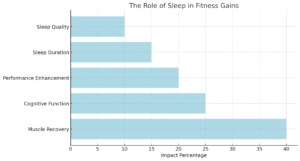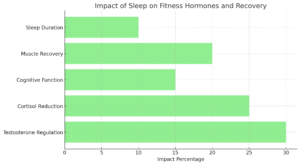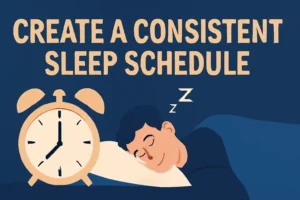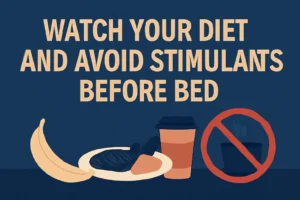When it comes to achieving peak physical performance, most fitness enthusiasts and athletes focus on their workout routines and nutrition. However, one of the most significant factors often overlooked is sleep. Sleep is an essential component of any successful fitness journey. It’s not just about getting enough hours of rest, but also the quality of sleep you get. Sleep plays a crucial role in muscle recovery, cognitive function, and performance enhancement.
Studies have shown that getting 7-9 hours of quality sleep can increase your muscle recovery by 30% and improve athletic performance by up to 20%.” Source: Sleep and Performance – National Sleep Foundation
This blog will explore how sleep affects your fitness gains, from muscle growth and recovery to athletic performance and mental sharpness. We will dive into the science behind sleep and explain why it is as important as your workout routine in achieving your fitness goals. By the end of this article, you’ll be equipped with the knowledge to prioritize sleep and integrate sleep optimization techniques into your fitness plan.
The Link Between Sleep and Muscle Recovery
How Sleep Aids in Muscle Repair and Growth
When you work out, your muscles undergo a process of stress and micro-tears. While this is a natural part of building strength and muscle mass, the repair and growth of muscles happen primarily during sleep. This is why a consistent and restorative sleep pattern is essential for muscle recovery.

The Role of Growth Hormone in Muscle Repair
During deep sleep, your body releases growth hormones (GH), which are responsible for repairing and rebuilding damaged muscle tissue. These hormones help stimulate muscle growth and fat burning, enhancing overall fitness. According to studies, the release of GH peaks during deep sleep, especially during the early part of the night. Without adequate sleep, your body’s ability to recover and rebuild muscle tissue diminishes, affecting your progress and increasing the risk of injuries.
Sleep and Protein Synthesis
Protein synthesis is another key process for muscle growth that occurs during sleep. When you sleep, your body uses the amino acids from protein to rebuild muscle fibers broken down during exercise. The longer you stay in deep sleep, the more efficient your body becomes at synthesizing proteins and strengthening muscles.
The Importance of Sleep for Hormonal Balance in Fitness
Testosterone and Sleep: The Key to Strength and Endurance
Testosterone plays a crucial role in muscle development, strength, and performance. In fact, testosterone levels are directly linked to your ability to build lean muscle mass and improve your performance in the gym. Quality sleep helps regulate testosterone production, which typically peaks during deep sleep stages.

Studies show that sleep deprivation significantly reduces testosterone levels in both men and women, which can hinder muscle growth, strength development, and recovery. By prioritizing quality sleep, you can maintain higher testosterone levels, ensuring that your body is ready to perform and recover.
Cortisol: The Stress Hormone and Its Impact on Fitness
On the other hand, cortisol, the stress hormone, can negatively affect fitness progress. When cortisol levels are elevated, the body enters a catabolic state, breaking down muscle tissue for energy instead of repairing it. Chronic sleep deprivation leads to an increase in cortisol levels, which not only impacts muscle recovery but also promotes fat storage and increases the likelihood of injury.
When you get enough sleep, cortisol levels naturally decrease, allowing your body to focus on muscle recovery and performance rather than being stuck in a stressed state.
How Sleep Affects Cognitive Function and Performance
Mental Sharpness and Sleep for Better Workout Efficiency
Sleep does more than repair muscles and balance hormones—it also affects cognitive function. Athletes and fitness enthusiasts who get enough sleep tend to experience better focus, coordination, and reaction time during their workouts. This mental clarity is essential for improved workout performance and technique.
In a study conducted by Stanford University, athletes who increased their sleep time saw significant improvements in sprinting times, endurance, and overall athletic performance. In contrast, sleep deprivation can lead to slower reaction times, poor concentration, and a lack of motivation, all of which can affect your training results.
Sleep and Its Role in Reducing Fatigue and Improving Decision-Making
When you’re well-rested, your brain functions at its optimal level, helping you make quick, accurate decisions during training and competition. Lack of sleep, however, negatively impacts decision-making, leading to poor performance and potentially dangerous mistakes. Whether you’re lifting weights, playing a sport, or engaging in endurance training, proper rest improves cognitive function, reduces fatigue, and supports better decision-making.
The Role of Deep Sleep in Recovery and Fitness Gains
Why Deep Sleep Is Crucial for Muscle Recovery
Not all sleep is created equal, and deep sleep is the most crucial phase for muscle recovery and overall fitness. Deep sleep, also known as slow-wave sleep (SWS), is when the body enters its most restorative state. This is when blood flow to muscles increases, providing essential nutrients that aid in muscle repair and growth.
During deep sleep, the body releases the highest amount of growth hormone, facilitating the healing of micro-tears in muscle fibers. The longer you spend in deep sleep, the more effective your muscle recovery will be. If you’re struggling with poor sleep quality, it could prevent you from reaching the deeper stages of sleep, ultimately hindering your fitness progress.
Sleep Cycles and Their Impact on Recovery
A complete sleep cycle includes various stages: light sleep, deep sleep, and REM (Rapid Eye Movement) sleep. Each stage plays a vital role in the recovery process. Deep sleep is where the majority of muscle recovery and growth takes place, while REM sleep contributes to cognitive function and memory retention.
Getting enough hours of quality sleep ensures that you experience multiple full sleep cycles each night, allowing your body to fully recover from your workouts and be ready for the next challenge.
Sleep Deprivation: The Hidden Barrier to Fitness Progress
The Negative Effects of Sleep Deprivation on Performance
Sleep deprivation can have a detrimental effect on your fitness progress. When you don’t get enough sleep, your body’s ability to recover from workouts is compromised, leading to slower recovery times and reduced performance. Your muscles may take longer to repair, and your endurance levels may drop. The lack of sleep can also result in muscle soreness, increased risk of injury, and impaired cognitive function.
Furthermore, sleep deprivation increases the production of cortisol, a stress hormone that contributes to muscle breakdown and fat retention. This hormonal imbalance can hinder fat loss and muscle growth, making it harder to achieve your fitness goals.
How Sleep Deprivation Impairs Recovery
Sleep is the body’s natural repair mechanism, and without sufficient sleep, you miss out on vital recovery time. The lack of restorative sleep after workouts delays the healing process of microtears in muscle fibers, which leads to slower muscle growth and a greater risk of injury. This is why athletes who suffer from chronic sleep deprivation often experience setbacks in their training, as their bodies aren’t given enough time to fully recover.
Tips to Optimize Your Sleep for Fitness Gains
1. Create a Consistent Sleep Schedule

One of the most effective ways to improve sleep quality is to establish a consistent sleep schedule. Going to bed and waking up at the same time every day helps regulate your circadian rhythm, making it easier for you to fall asleep and wake up naturally. Aim for at least 7-9 hours of sleep each night to maximize recovery and muscle growth.
2. Optimize Your Sleep Environment
The environment in which you sleep plays a critical role in the quality of your rest. Make sure your bedroom is cool, dark, and quiet to promote better sleep. Consider using blackout curtains, white noise machines, or earplugs to eliminate distractions. A comfortable mattress and pillow also go a long way in ensuring that you get a deep, restful sleep.
3. Avoid Screen Time Before Bed
The blue light emitted by electronic devices such as smartphones, tablets, and computers interferes with melatonin production, making it harder for your body to fall asleep. Try to avoid using screens at least 30 minutes to an hour before bed. Instead, engage in relaxing activities like reading a book, practicing meditation, or listening to calming music to help prepare your mind and body for sleep.
4. Watch Your Diet and Avoid Stimulants Before Bed

Caffeine, nicotine, and large meals can interfere with your ability to fall asleep. Avoid consuming these substances late in the evening. Additionally, try not to eat large meals too close to bedtime, as digestion can disturb your sleep. If you’re hungry before bed, opt for a light, healthy snack, such as a handful of nuts or a banana, which won’t disrupt your sleep.
5. Implement Relaxation Techniques
To help your body wind down before bed, try practicing relaxation techniques such as deep breathing, progressive muscle relaxation, or yoga. These methods can reduce stress, lower heart rates, and prepare your body for a restful night’s sleep. Engaging in these activities can help improve sleep quality, leading to better recovery and performance in the gym.
Conclusion: Prioritize Sleep for Optimal Fitness Results
To maximize your fitness gains, it’s essential to recognize the importance of sleep. It’s not just about the hours you spend in bed, but the quality of sleep you get. Sleep plays a vital role in muscle recovery, hormonal regulation, and cognitive function, all of which contribute to better performance in the gym and in life.
By prioritizing sleep and implementing sleep optimization strategies, you can enhance muscle recovery, boost athletic performance, and ultimately achieve your fitness goals faster and more effectively. So, next time you’re tempted to sacrifice sleep for an extra workout or more work hours, remember: rest is just as important as training when it comes to achieving your fitness goals.
Also, discover how AI-powered workout plans are revolutionizing fitness in the modern world. Check out our latest blog for insights on how technology is shaping your fitness journey: AI-Powered Workout Plans: Revolutionizing Fitness for the Modern World.
FAQs
Q1: How much sleep do I need to improve my fitness?
Adults typically need 7-9 hours of sleep per night for optimal health and fitness. Athletes or those with intense workout routines may require additional hours of sleep for full recovery.
Q2: Can a short nap help with muscle recovery?
Yes, a 20-30 minute nap can help reduce fatigue and enhance cognitive function, especially if you didn’t get enough sleep the night before. However, avoid long naps as they can interfere with nighttime sleep.
Q3: Does exercise affect sleep quality?
Exercise can improve sleep quality by reducing stress and anxiety. However, intense exercise late in the evening can elevate adrenaline levels, making it harder to fall asleep. Aim to finish your workouts at least 2-3 hours before bed.


